
Erechthias is a genus of the fungus moth family, Tineidae. Therein, it belongs to the subfamily Erechthiinae, of which it is the type genus. The exact circumscription of this genus is still disputed, but it may encompass more than 150 species.

Erechthias flavistriata, the sugarcane bud moth, is a moth of the family Tineidae. It was described by Lord Walsingham in 1907 from a specimen collected in Hawaii, but is probably an introduced species. It is found in large parts of the Pacific Rim including in New Zealand, the Cook Islands, the Marquesas, Rapa Iti, Fiji, the New Hebrides, the Kermadec Islands, the Solomons, Java and Malaya. It has been spread widely by people and probably has travelled to many islands throughout much of the Pacific.
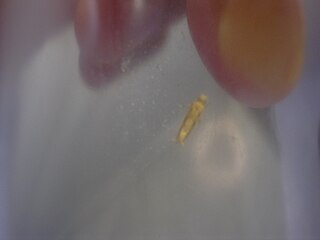
Erechthias minuscula, the erechthias clothes moth, is a moth of the family Tineidae. It was first described by Lord Walsingham in 1897. It is widespread and has been recorded from Africa, Sri Lanka, Java, Australia, the Caroline Islands, Fiji, Samoa, the Marquesas, the West Indies, Hawaii and Florida.

Erechthias simulans is a species of fungus moth. It is here considered to belong to the somewhat controversial type genus of its subfamily Erechthiinae, though even fairly recently some authors have proposed to retain other genera such as Decadarchis separate from Erechthias. Decadarchis, with E. simulans as type species, would in fact contain this moth and its closest relatives, regardless whether it is recognized as full genus or as subgenus. These relatives are generally held to be a group of mainly Polynesian species. E. simulans has also been mistaken for a species of the closely related genus Comodica; while the delimitation of this versus Erechthias/Decadarchis is not universally agreed upon, E. simulans is not included in Comodica anymore by modern authors.
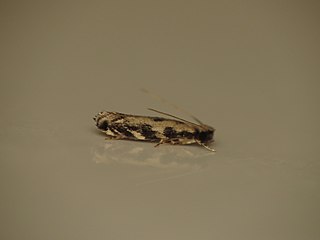
Erechthias zebrina is a fungus moth. Initially, it was mistakenly believed to be an ermine moth of genus Argyresthia.
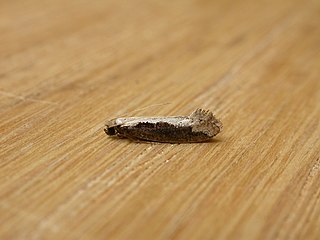
Erechthias diaphora is a moth of the family Tineidae. It is known from Australia, including New South Wales, Queensland and Victoria.

Erechthias dracaenura is a moth of the family Tineidae. It is endemic to São Tomé Island, an island off the western equatorial coast of Central Africa. The species was described by Edward Meyrick in 1934.

Erechthias lychnopa is a species of moth in the family Tineidae. This species is endemic to New Zealand and has only been collected in a karaka grove at Sinclair Head in Wellington in November. It has yet to be collected again. It has been hypothesised that the larvae inhabit dead wood. It is classified as "Data Deficient" by the Department of Conservation.
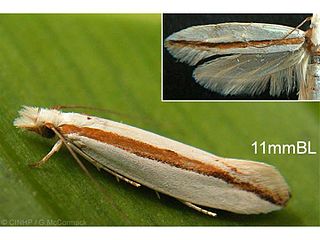
Erechthias psammaula, the brown-stripe moth, is a moth of the family Tineidae. It is found on Fiji, French Polynesia, Tonga and the Cook Islands.

Uromycladium is a genus of rust fungi in the family Pileolariaceae. It was circumscribed by mycologist Daniel McAlpine in 1905. The genus was established by McAlpine for rusts on Acacia with teliospores that clustered at the top of a pedicel.

Uromycladium tepperianum is a rust fungus that infects over 100 species of Acacia and related genera including Paraserianthes in Australia, south-east Asia, the south Pacific and New Zealand. The acacia gall rust fungus species Uromycladium tepperianum has been introduced to South Africa as a biological control on the invasive Australian shrub Acacia saligna.
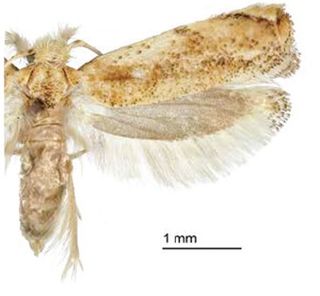
The Erechthiinae are a subfamily of moth of the family Tineidae.
Erechthias beeblebroxi is a moth of the family Tineidae. It is endemic to Australia, where it has been recorded from Queensland.

Erechthias charadrota is a species of moth in the family Tineidae. It was first described by Edward Meyrick in 1880. This species is endemic to New Zealand and is found on both the North and South Islands. It inhabits native forest and the larvae likely feed on either deceased plant detritus or tough leaves of plants such as palms or flax. Adults are on the wing commonly from October to February and it is likely this species has two broods per year. Adults have been trapped via a blacklight.

Erechthias chasmatias is a species of moth in the family Tineidae. It was first described by Edward Meyrick in 1880. This species is endemic to New Zealand and is found in the North Island. This species inhabits native bush. Adults are on the wing from October to April and have been collected by beating small trees and foliage.

Erechthias exospila is a species of moth of the family Tineidae. It was first described by Edward Meyrick in 1901. It is endemic to New Zealand and can be found in the North Island as well as the Poor Knights and D'Urville Islands. This species inhabits native forest. Larvae of species in the genus Erechthias feed on dead plant debris or the tough leaves of plants such as palms. E. exospila frequents the dead leaves of Astelia. Adults have been observed in November and February. Specimens of this species have been collected via malaise trap and beating shrubs.

Erechthias stilbella is a species of moth in the family Tineidae. It was first described by Edward Doubleday in 1843. This species is endemic to New Zealand and is found in the North and South Islands. This species inhabits native forest and bush and can also be found in domestic gardens. Larvae feed on dead plant debris or tough leaves of plants such as palms. Adults are on the wing from October until March. Adults rest on tree trunks or fences during the day.

Erechthias capnitis is a moth of the family Tineidae, first described by Alfred Jefferis Turner in 1918. It is originally endemic to Norfolk Island and is recorded as having arrived in New Zealand by 1977. This species can be found in the north half of the North Island of New Zealand as well as in New Plymouth and Wellington. Larvae feed on dry dead wood as well as on Cordyline australis. Adult moths are on the wing throughout the year and are attracted to light.
















